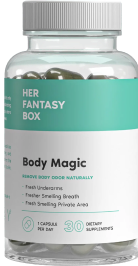There’s a lot of buzz about chlorophyll on social media—eye-catching green drinks, influencer routines, and plenty of bold claims. Chlorophyll supplements are popular because they’re easy to take and provide a concentrated way to add a plant-derived ingredient to your routine. But what do we actually know? This article separates common claims from what the evidence currently shows so you can make an informed choice (and, if you’d like to try a chlorophyll supplement, you can explore our Body Magic Chlorophyll Pill).
What Is Chlorophyll?
Chlorophyll is the green pigment in plants that helps capture light for photosynthesis—how plants convert light into energy. 2
Why Are Chlorophyll Supplements Popular?
Beyond the aesthetic appeal, many people like the convenience of a capsule or liquid. Some also hope chlorophyll can support general wellness goals. At the same time, online claims often go far beyond the current research, so it’s helpful to look at what’s actually been studied.
Myth vs. Fact: “Detox”
It’s common to see chlorophyll described as a “detox” ingredient. Some early research explores how chlorophyll or chlorophyllin may interact with certain compounds in tightly controlled settings, but translating that into broad “detox” promises isn’t supported by strong human data. More studies are needed to understand if and how this matters in everyday use. 3
Myth vs. Fact: Weight Loss
Evidence for weight-related effects is limited. A small study suggested changes in appetite cues with a green-plant extract, but it involved a modest sample and specific conditions. This is not enough to support general weight-loss claims. 7
Myth vs. Fact: Skin
There are a few small studies on topical chlorophyll for cosmetic skin outcomes. There’s little to no clinical evidence that ingesting chlorophyll improves skin appearance. Stronger human research is needed. 5
Myth vs. Fact: Energy
Claims that chlorophyll boosts energy aren’t supported by robust human studies at this time. 5
Myth vs. Fact: Cancer
Chlorophyll should not be used to prevent or treat cancer. Some laboratory and animal research looks at how chlorophyll or chlorophyllin interact with specific compounds, but this does not translate into clinical cancer claims. Human evidence remains limited and preliminary. 5 4 9
Using Chlorophyll Supplements Thoughtfully
If you’re considering chlorophyll, talk with your healthcare provider—especially if you’re pregnant, nursing, have a medical condition, or take medications. Experiences vary, and guidance from a clinician helps you decide what fits your routine.
- Follow the label: Use only as directed by the product.
- Watch for sensitivities: If you notice discomfort or unusual reactions, stop use and check in with a clinician.
- Set realistic expectations: Current human data do not support broad claims around “detox,” weight loss, energy boosts, or disease prevention.
You can explore our chlorophyll option here: Body Magic Chlorophyll Pill. It features a blend that includes chlorophyll alongside complementary ingredients as part of a freshness-focused, everyday routine—no medical promises.
Real Reviews, Real Customers
Expert Perspective
Nutrition experts often note that chlorophyll can be part of a routine, but it’s not a shortcut. Eating a variety of vegetables (for fiber and other nutrients) and maintaining overall healthy habits still matter most. 1
References
- Alexander, Heather, and Lindsey Wohlford. 2021. “What are the benefits of drinking chlorophyll?” MD Anderson Cancer Center.
- “Chlorophyll | Definition, Function, & Facts.” Britannica.
- “Enhancing Health Benefits through Chlorophylls and Chlorophyll-Rich Agro-Food: A Comprehensive Review.” NCBI, 2023.
- Li B. et al. “Chlorophyllin e4 … human bladder cancer cells.” Oncol Rep. 2012.
- Lubeck, Brittany. “Health Benefits of Chlorophyll—Supplements.” Verywell Health, 2023.
- Manaker, Lauren. “Is TikTok’s Liquid Chlorophyll the Health Cure-All?” Verywell Health, 2021.
- Montelius, C. et al. “Body weight loss … green-plant membranes …” 2014.
- Britannica entry: “Chlorophyll.”
- Vaňková, K. et al. “Chlorophyll-Mediated Change … Pancreatic Cancer Cells.” 2018.
This article is for general information only and does not provide medical advice. It is not intended to diagnose, treat, cure, or prevent any disease. Always consult a qualified healthcare professional for guidance about supplements or health concerns.








